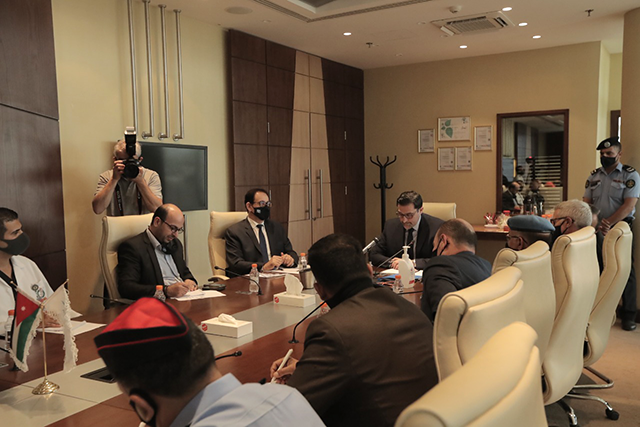- Local News
- Friday-2020-09-04 | 02:50 pm

Regular flight operations will resume on September 8, in accordance with three classifications regulating arrival to the Kingdom, Transport Minister Khaled Saif said on Thursday.
Speaking during a press conference at Queen Alia International Airport (QAIA), Saif said that the three epidemiological classifications include green, yellow and red countries, the Jordan News Agency, Petra, reported.
Countries classified as "green zones” include Canada, Cyprus, Czech Republic, Denmark, Greece, Hong Kong, Hungary, Lithuania, Malaysia, Morocco, Poland, Switzerland, Thailand, Turkey and Tunisia, while countries classified as "yellow” include Algeria, Austria, Germany, Italy, Malta, the Netherlands and the UAE.
The red list includes Bahrain, Belgium, France, Iraq, Kuwait, Lebanon, Libya, Oman, Qatar, Romania, Russia, Saudi Arabia, Spain, the UK, Ukraine, the US, Egypt, Sudan and Yemen.
The minister said that the decision to resume flight operations was taken to help Jordanians return home, Petra reported.
Travellers coming to Jordan from "green countries", nations deemed low-risk for the pandemic, are required to have spent the last 14 days in the country of departure and must present a negative PCR test conducted within 72 hours prior to departure, he added.
Travellers coming from "green countries” must also conduct another COVID-19 test upon arrival to the Kingdom at their own expense and have to wait for the result, the minister said, noting that arrivals who tested negative will not undergo institutional quarantine.
Meanwhile, travellers from "yellow countries" must present a negative PCR test conducted within 72 hours prior to the scheduled travel, he said.
Travellers coming from "yellow countries” are also required to have spent the last 14 days in the country of departure and present a negative PCR test conducted within 72 hours prior to their flight.
The minister also said that they must conduct another COVID-19 test upon arrival to the Kingdom, at their own expense, and also required to undergo a three-night/four-day institutional quarantine, without waiting for the result of a COVID-19 test, while those leaving quarantine sites are required to undergo self-quarantine for a week.
Travellers coming from "red countries”, or any other country that is not listed in the epidemiological classification, are required to present a negative PCR test conducted within 72 hours prior to the scheduled departure.
They are also required to conduct a second test upon arrival at their own expense, and must undergo a seven-day institutional quarantine without waiting for the results.
A third test will be conducted on the fifth or sixth day of arrival, and those departing the quarantine site are required to undergo self-quarantine for a week, according to the minister.
Saif pointed out that passengers pay for the PCR test via "visit Jordan platform” upon arrival at the airport, pointing out that those who provide false information will be fined some JD10,000.
He pointed out that passengers are required to sign a written undertaking and a special form, while foreign travellers must have valid health insurance.
Saif also said that the airport employees ask for proof that the passengers had spent 14 days in the departure country in response to journalists’ questions regarding tracking passengers inside the Schengen countries.
The initial flights will be "experimental”, consisting of four aircraft and will be subject to continuous evaluation, while the following week eight aircraft will be operated, he added.
The press conference was attended by Civil Aviation Regulatory Commission (CARC) Chief Haitham Misto, Airport International Group (AIG) CEO Nicolas Claude and Director of Communicable Diseases at the Ministry of Health Hadil Al Sayeh.
Misto said that Jordanian airports have not stopped operating since the first day of the COVID-19 pandemic, and what has happened is a change in travel conditions.
The Kingdom has not prevented any passengers from leaving the country provided that flights were available to their destinations, Misto added.
As for travellers wishing to return from the countries not included on the list, the Ministry of Health will assess the situation based on requests from the concerned authorities, he added.
Misto also pointed out that the classification includes the countries which have direct flights to the Kingdom.
Also speaking at the press conference, Claude reiterated the QAIA’s preparedness to receive passengers on September 8, highlighting that the airport did not close during the past period, as flights varied from the return of Jordanians to domestic flights and air freights.
The health ministry official said that the cost of PCR test is JD40, while the result needs some three hours, noting that travellers with negative results are allowed to enter the country.









